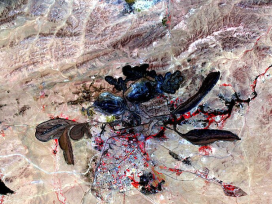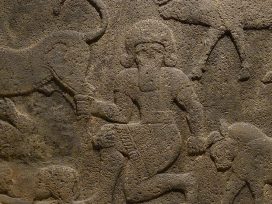‘Nature’, as a troubled thematic catchall, is often sidelined in serious debate. When discussing and reflecting on moments of political crisis, environmental factors tend to be vaguely rather than directly referenced, even when their relevance is as large as a weighty mammal. If not already dealing with a green agenda, politicians tend to rest on nature only when of strategic advantage: stalling decisions until winter cools off protester fervour; pitching battles against a virus to drive control measures rather than developing responsible, holistic decision-making. From government or corporate-driven extractivism to global food security, industrial activity based on consuming natural ‘resources’, even if ultimately detrimental to human health, is seen as a God-given and/or an evolutionary right.
Anthropocentrism in Rafi Youatt’s Public Seminar article, written in response to John Keane on slow-motion ecological democide, stands for more than the dominant position that humans have asserted over the nonhuman. Youatt identifies two key anthropocentric catastrophes: territorial state sovereignty over nature, which through international environmental law enables ‘extractivism and geopolitics … shared by democratic, autocratic, socialist and postcolonial regimes alike’; and the assumption that we know what the ‘anthro’ norm is, reflecting negatively on anyone forced into a less than human condition ‘such as animalized prisoners at Guantanamo, those in concentration camps in Auschwitz who were rendered as “bare life” or the state-of-nature natives who appeared in the conquering of the New World.’
Described as ‘deeply rooted’ and ‘hydra-headed’, Youatt recommends that we avoid anthropocentrism when contemplating how political theory should approach ecology. With inference to Keane’s writing, he warns that ‘this general turn to an ecological demos could well be read as a peculiarly inverted anthropocentrism, which confuses the exclusion of nature from moral and political life with a maneuver to incorporate nonhuman life into human political circuits.’ Democracy as it stands, as a human-serving system, in Youatt’s opinion is inappropriate for the nonhuman. ‘The way forward lies not in a democracy in which greater representation and rights are extended to nonhuman nature … Rather, we need to develop a wider conception and practice of politics, as a process engaged with the nonhuman world, which in turn intersects human aspirations to create more just political institutions.’
A third way
As an alternative, he proposes ‘a Third Politics aimed neither at democracy within states, nor at global scales of greening … or projects for inclusive cosmopolitan tolerance.’ Certainly, there’s confusion in the West, at the very least, regarding how action to overt the worst impacts of climate crisis can be truly decisive. Few believe that the individual’s efforts to downsize and reuse will do more than provide a good example now that we’ve seen through big business’ diversionary ‘carbon footprint’ tactics. Change needs to happen on an industrial level. And by that I don’t mean the raft of businesses that have already picked up on a green washing profit margin. Keane recognizes the worth of what he calls ‘monitory democracy’: ‘people and their chosen and trusted representatives warding off abusive power, protecting their lives as equals against all forms of unequal power relations with the help of bodies such as independent courts, uncorrupted election commissions and civil society watchdogs’.
What might this ‘Third Politics’ that ‘calls for seeing contemporary projects for human democracy as simultaneously encountering and confronting a world of other political formations’ constitute? Is it a reference to the ‘third landscape’, which recognizes those environments that subsist without human intervention? Are we to read this ‘third way’, which normally describes something other than right and left-wing within political terms, as an attempt to provide an independent position for nature aside from our human-centric obsessions?
Mobility as challenge
‘The mobility of nature’, writes Youatt, ‘is a challenge to democratic institutions,’ which he then connects to a debatable contrary human tendency ‘to live life in relatively rooted paths and routes.’ Although not often undertaken through choice, plenty of people are currently migrating or otherwise displaced worldwide. When forcibly on the move, chaos takes over, whether fleeing war or environmental collapse – and it may be time to drop the divisions here, given that one disaster is symptomatic of the other and vice versa (whether war leading to biome destruction or extractivism leading to civil wars). The turmoil that forced migration causes is often bizarrely subsumed by those more settled, disturbed by the thought of new arrivals rather than recognizing whose plight is greater.
Olga Bubich’s autobiographical article on searching for the means to make family ties across time and space while being displaced provides a valuable counterpoint. The author uses photography to connect physically with those she can no longer or never could meet. Her account describes the ability to reach out in times of distress, developing awareness and securing peace of mind despite the odds – characteristics that may serve well elsewhere.
Nature at the table
When facing a lack of connectedness with ecological concerns, even acknowledging that the human in the room is part of nature is a perceptual work-in-progress. Remaining aware that all the elements and materials even in our everyday environments – sunlight, oxygen-providing plants, wooden beams, aluminium sutures, epoxy resin, the room itself – have a natural basis is a further step. Extending that to biomes we benefit from but don’t directly experience is yet another level. The care needed to recognize these seemingly abstract realities perhaps comes from looking at the situation differently.
Keane proposes that democracy should encompass and account for a slow-motion ecological tempo to avoid this deficiency in vision. Youatt, meanwhile, concludes that ‘if democracy is to survive and evolve – and there is no reason to think it cannot – it must be both less anthropocentric, and more open to its ecological embeddedness.’ Either way, that nature as ecology is now on or at the political theory table is a comforting thought and imperative.






